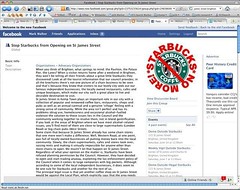Recent years have seen many voluntary and community sector infrastructure bodies spend five figure sums on database projects. Some have been successful, others have not. The flood of such projects is now slowing to trickle, which may explain why one of the biggest suppliers has pulled out the market, leaving its customers across the UK without support for their products.
Such projects are always complex, especially when the client has little experience of how to get what they need. The databases being commissioned are shared information systems, helping to promote better co-working between agencies in a local area. They may also be linked to shared website systems, which include the ability for member organisations to build and manage their own sites.
I'd estimate that at least £1m has been spent in the UK on similar products in the space of three years, and one of the most popular suppliers has been Uniservity.
Not only did they have a good product and recruited staff with experience of the sector, they came with an endorsement from NAVCA, the lead body for CVS Chief Officers in the UK. Now they've pulled out of the market, and suggested that their customers switch to other suppliers for product development and support.
Informal research suggests Uniservity has a reasonable share of the market, so this will be a big problem for lots of people who thought they were investing in better information systems for the long term. NAVCA's decision to give them its blessing could also be seen as a dent in the reputation of the sector.
Below is a message from the NAVCA Chief Officer which explains its position. It's good to see someone so senior saying sorry, and let's hope others who backed Uniservity - and other suppliers - will be just as candid about the perils of their national clout skewing the market.
Procurement and investment
On the other hand this is a complex issue that deserves ongoing attention, well beyond a review of NAVCA's relationships with suppliers.
From the supplier side Uniservity certainly seemed to be a credible option. I assume that there are financial reasons to withdraw from a market in which they are a leading player, which perhaps reflects a lack of ongoing income from their initial sales. There are very few new clients beyond the Consortia which had ChangeUp funding for these projects, and few of them will have budgeted for spend beyond years one or two.
I'd suggest Uniservity's withdrawal is a symptom of bigger problems on the client side. These include unrealistic funding deadlines, lack of focus in the face of a blizzard of "urgent" issues, and the shortcomings of the procurement and project management expertise at a local level?
I have also been surprised at how few people spending the money have spoken to one another either before, during or after the procurement process - and there are suggestions of large discrepancies between what was paid for similar products.
Leaving aside whether the money would have better spent on projects other than databases or websites, this is a very common problem when budgets do not follow through the implementation process. Even if implemented perfectly first time [ha ha] all databases and websites need to grow and change as they are used, which means more money in years three and beyond.
The current problems also shows how valuable independent advice and support is for the sector - and how carefully that independence needs to be patrolled at national, regional and local levels.
What next?
The network of regional ICT Champions is being asked to help review the situation and support organisations affected by Uniservity's decision. I hope we can look beyond Uniservity's clients to all similar projects and how they're progressing.
We can help quantify the size and nature of the problem, share best practise, create a collective voice with the remaining suppliers, encourage peer support amongst people with the same issues and identify key factors that make such projects a success.
Amongst the support available is a popular workshop I delivered in February about how to choose a database, as well as the wealth of guidance about choosing and using databases in the ICT Hub Knowledgebase. I'm sure we can also come up with more help specific to the ongoing implementation of these complex systems, perhaps involving volunteer support through IT4Communities.
Expect to see more on this over the coming year...
= = = =
Dear Chief Officers
I gather from a recent email conversation with Steve Place, Chief Executive at Dorset Community Action, that support from Uniservity is becoming more and more difficult to obtain.
NAVCA's relationship with Uniservity over the past four years was discussed at the recent Trustee Board meeting in the context of new "guidelines for ethical business development" agreed by Trustees.
I would like to offer my personal apology for the way Uniservity turned out. I was responsible for the early discussions with Uniservity and for the subsequent "partnership" with NAVCA.
At the time of the early discussions Uniservity was highly recommended to NAVCA by two members in the North West. They had both bought the Uniservity database product and were very pleased with its implementation. In presentations to NAVCA Uniservity representatives were convincing - they had a real grasp of the needs of NAVCA members and seemed committed to developing and sustaining the product.
Hindsight is always a great thing as we know. However, it is fair to say that I should have been more circumspect about the Uniservity offer. It was a small company with a limited track record outside the NAVCA members in the North West.
It has turned out badly for too many NAVCA members. The learning we have taken from this sorry story is that we will not enter into a partnership of this sort again with a database supplier.
Good wishes
Kevin
______________________________
Kevin Curley
Chief Executive
NAVCA (National Association for Voluntary and Community Action)
The Tower
2 Furnival Square
Sheffield S1 4QL
 A Facebook group has been started by a campaign in Brighton that wants to close down Starbucks newest coffee shop in the city. As well as rejecting the corporate giant in favour of the numerous small independent coffee shops the group is also raising awareness of the fact that Starbucks is choosing to ignore the fact that it doesn't have planning permission to be there.
A Facebook group has been started by a campaign in Brighton that wants to close down Starbucks newest coffee shop in the city. As well as rejecting the corporate giant in favour of the numerous small independent coffee shops the group is also raising awareness of the fact that Starbucks is choosing to ignore the fact that it doesn't have planning permission to be there.



 I love mailing lists and discussion forums because I can dip into specialist networks and keep track of trends and ideas, just by running through a folder full of emails. I also love having email on my Blackberry because I can ignore stuff as it comes into my in-tray on my computer at work, but then catch up later [usually as I put the kids to bed].
I love mailing lists and discussion forums because I can dip into specialist networks and keep track of trends and ideas, just by running through a folder full of emails. I also love having email on my Blackberry because I can ignore stuff as it comes into my in-tray on my computer at work, but then catch up later [usually as I put the kids to bed]. Many people around the world use Drupal to set up sites for not for profit organisation - we've been using at SCIP for several years, including our own site at
Many people around the world use Drupal to set up sites for not for profit organisation - we've been using at SCIP for several years, including our own site at 


 Flickr/brightonmarkie
Flickr/brightonmarkie Facebook/Mark Walker
Facebook/Mark Walker Twitter/scipmark
Twitter/scipmark YouTube/scipmark
YouTube/scipmark Last.fm/scipmark
Last.fm/scipmark Del.icio.us/scipmark
Del.icio.us/scipmark GMail/Mark Walker
GMail/Mark Walker